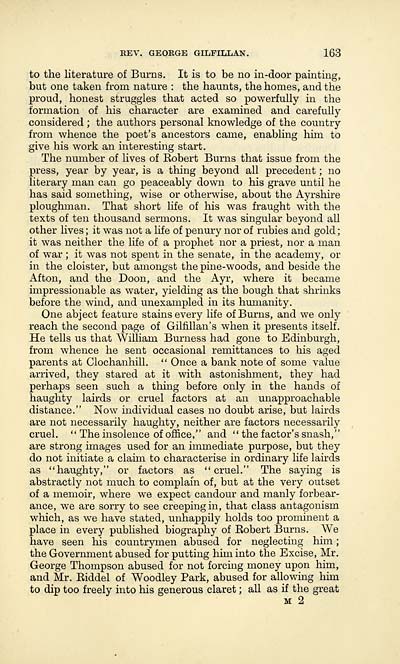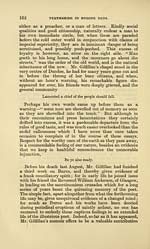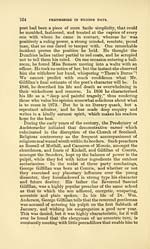Perthshire in bygone days
(191) Page 163
Download files
Complete book:
Individual page:
Thumbnail gallery: Grid view | List view

REV. GEORGE GILFILLAN. 163
to the literature of Burns. It is to be no in-door painting,
but one taken from nature : the haunts, the homes, and the
proud, honest struggles that acted so powerfully in the
formation of his character are examined and carefully
considered ; the authors personal knowledge of the country
from whence the poet's ancestors came, enabling him to
give his work an interesting start.
The number of lives of Eobert Burns that issue from the
press, year by year, is a thing beyond all precedent ; no
literary man can go peaceably down to his grave until he
has said something, wise or otherwise, about the Ayrshire
ploughman. That short life of his was fraught with the
texts of ten thousand sermons. It was singular beyond all
other lives ; it was not a life of penury nor of rubies and gold ;
it was neither the life of a prophet nor a priest, nor a man
of war ; it was not spent in the senate, in the academy, or
in the cloister, but amongst the pine-woods, and beside the
Afton, and the Doon, and the Ayr, where it became
impressionable as water, yielding as the bough that shrinks
before the wind, and unexampled in its humanity.
One abject feature stains every life of Burns, and we only
reach the second page of Gilfillan's when it presents itself.
He tells us that William Burness had gone to Edinburgh,
from whence he sent occasional remittances to his aged
parents at Clochanhill. " Once a bank note of some value
arrived, they stared at it with astonishment, they had
perhaps seen such a thing before only in the hands of
haughty lairds or cruel factors at an unapproachable
distance." Now individual cases no doubt arise, but lairds
are not necessarily haughty, neither are factors necessarily
cruel. " The insolence of office," and "the factor's snash,"
are strong images used for an immediate purpose, but they
do not initiate a claim to characterise in ordinary life lairds
as "haughty," or factors as "cruel." The saying is
abstractly not much to complain of, but at the very outset
of a memoir, where we expect candour and manly forbear-
ance, we are sorry to see creeping in, that class antagonism
which, as we have stated, unhappily holds too prominent a
place in every published biography of Bobert Burns. We
have seen his countrymen abused for neglecting him ;
the Government abused for putting him into the Excise, Mr.
George Thompson abused for not forcing money upon him,
and Mr. Riddel of Woodley Park, abused for allowing him
to dip too freely into his generous claret ; all as if the great
m 2
to the literature of Burns. It is to be no in-door painting,
but one taken from nature : the haunts, the homes, and the
proud, honest struggles that acted so powerfully in the
formation of his character are examined and carefully
considered ; the authors personal knowledge of the country
from whence the poet's ancestors came, enabling him to
give his work an interesting start.
The number of lives of Eobert Burns that issue from the
press, year by year, is a thing beyond all precedent ; no
literary man can go peaceably down to his grave until he
has said something, wise or otherwise, about the Ayrshire
ploughman. That short life of his was fraught with the
texts of ten thousand sermons. It was singular beyond all
other lives ; it was not a life of penury nor of rubies and gold ;
it was neither the life of a prophet nor a priest, nor a man
of war ; it was not spent in the senate, in the academy, or
in the cloister, but amongst the pine-woods, and beside the
Afton, and the Doon, and the Ayr, where it became
impressionable as water, yielding as the bough that shrinks
before the wind, and unexampled in its humanity.
One abject feature stains every life of Burns, and we only
reach the second page of Gilfillan's when it presents itself.
He tells us that William Burness had gone to Edinburgh,
from whence he sent occasional remittances to his aged
parents at Clochanhill. " Once a bank note of some value
arrived, they stared at it with astonishment, they had
perhaps seen such a thing before only in the hands of
haughty lairds or cruel factors at an unapproachable
distance." Now individual cases no doubt arise, but lairds
are not necessarily haughty, neither are factors necessarily
cruel. " The insolence of office," and "the factor's snash,"
are strong images used for an immediate purpose, but they
do not initiate a claim to characterise in ordinary life lairds
as "haughty," or factors as "cruel." The saying is
abstractly not much to complain of, but at the very outset
of a memoir, where we expect candour and manly forbear-
ance, we are sorry to see creeping in, that class antagonism
which, as we have stated, unhappily holds too prominent a
place in every published biography of Bobert Burns. We
have seen his countrymen abused for neglecting him ;
the Government abused for putting him into the Excise, Mr.
George Thompson abused for not forcing money upon him,
and Mr. Riddel of Woodley Park, abused for allowing him
to dip too freely into his generous claret ; all as if the great
m 2
Set display mode to:
![]() Universal Viewer |
Universal Viewer | ![]() Mirador |
Large image | Transcription
Mirador |
Large image | Transcription
Images and transcriptions on this page, including medium image downloads, may be used under the Creative Commons Attribution 4.0 International Licence unless otherwise stated. ![]()
| Histories of Scottish families > Perthshire in bygone days > (191) Page 163 |
|---|
| Permanent URL | https://digital.nls.uk/94908690 |
|---|
| Description | A selection of almost 400 printed items relating to the history of Scottish families, mostly dating from the 19th and early 20th centuries. Includes memoirs, genealogies and clan histories, with a few produced by emigrant families. The earliest family history goes back to AD 916. |
|---|

